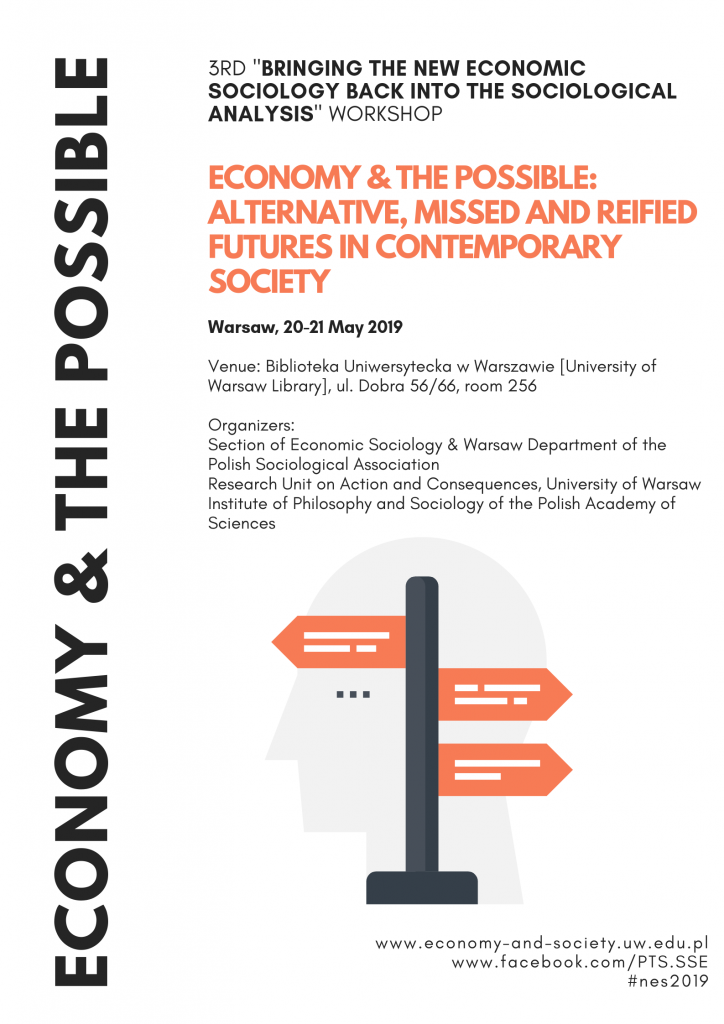CALL FOR PAPERS
Economy & the Possible: Alternative, Missed and Reified Futures in Contemporary Society
20-21 May 2019, Warsaw, Poland
The deadline for submission of abstracts is 10 December 2018.
http://economy-and-society.uw.edu.pl/
Guest speakers
Gary Herrigel (Department of Political Science,University of Chicago)
Marcin Serafin (Institute of Philosophy and Sociology, Polish Academy of Sciences; Max Planck Partner Group for the Sociology of Economic Life)
One of the most prevalent, yet still not rendered explicit, features of the contemporary society is that this is penetrated by the spectrum of what is possible. In general, this is a rhetoric which favors social action in the direction of innovation and search for opportunities of entrepreneurship. What is possible, in this sense, is a reinterpretation of the boundaries of social action or of what (else) can be achieved in the economic and political realm due, for instance, to technology. In this sense, the institutionalization of alternative economic forms is an advancement of what is possible – see sharing economy (UBER, Airbnb) as well as the more conventional (in terms of technology) financial cooperatives or modalities to access credit.

But, what is possible also appears beyond this spectrum of alternative, new and innovative economic activities. What is possible is a tool for reinterpreting the course of actions and for issuing disappointment and claims against what happened, or what the agents failed to achieve or to anticipate that it will happen. This logic of what would have been possible should the actors have acted properly guides, for instance, the disappointment regarding the failure to anticipate revolutionary moments or episodes of crisis – see the Arab Spring or the 2008 financial crisis.
Closely related, what is possible also works as a tool for reification certain futures and risks and for declaring that this will happen for the simple reason that there is possibility that these will. In these instances, what is possible is not any longer what is possible but rather what will happen in the case certain actions are undertaken. Herein, the logic of possibilism is inverted and this is associated with predictability and not indeterminacy. This logic can be observable in the narratives which reify shattering and calamitous scenarios – such as inevitable downturns, clashes of economic systems, limits of growth and resources etc.
What is possible is thus a powerful tool of mobilization, inspiration as well as of limiting and manipulation of social action and entrepreneurship in various domains. The dynamism of it can be located in the risk society wherein, as social scientists noticed, agents became more aware and reflexive regarding the possible and alternative worlds that modernity or the capitalist system have problems to achieve. But what is possible is far from a homogenous discourse, and it can be linked with all alternative, missed and reified futures in contemporary society, in the same time. Not to mention the fact, that this discourse is also far from being dominant. Not all agents or organizations look at what is possible, and there is also a lot if ignorance and reinterpretation of alternative and other possible modes of action.
The workshop welcomes contributions to this theme of what is possible both in terms of theory as well as research sites. The aim is to articulate the theme of what is possible and to offer a common background and analytical modality of framing.
The deadline for submission of abstracts is 10 December 2018. See also: Important Dates and Registration
Organizing Institutions
Section of Economic Sociology & Warsaw Department of the Polish Sociological Association
Research Unit on Action and Consequences of the University of Warsaw
Institute of Philosophy and Sociology of the Polish Academy of Sciences